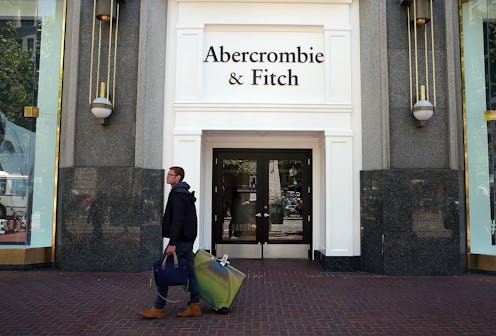News
Abercrombie's Look Policy Is Going To SCOTUS
Clothing company Abercrombie and Fitch’s “look policy” — its rules about what employees can and cannot wear — has come under scrutiny before. But now, for the first time ever, the company’s policy has landed them in front of the Supreme Court. On Wednesday, Abercrombie defended its decision to not hire applicant Samantha Elauf, who wore a headscarf, or hijab, to her interview. Elauf saw the hiring decision as religious discrimination; Abercrombie begs to differ.
Seven years ago, Elauf applied for a sales associate position at an Abercrombie Kids store in Tulsa. When she went in for the job interview, she wore a hijab in accordance with her Muslim faith, just as she had every day since she was 13. Elauf’s hijab did not comply with company dress code — which prohibits employees from wearing caps or the color black — and she did not get the job.
The decision led Equal Employment Opportunity Commission (EEOC) to bring a discrimination case against Abercrombie and Fitch, on behalf of Elauf. Abercrombie argues that their decision was not discriminatory because the company’s “look policy” is religion neutral.
According to Abercrombie, in order for Elauf to receive protection from Title VII — a federal law that prevents religious discrimination and requires employers to offer accommodation to employees’ religious needs — Elauf needed to explicitly tell the interviewer that her headscarf was worn for religious reasons.
However, EEOC argues that Elauf did not know about the companies’ “look policy” and thus would not have known that such a conversation needed to take place. According to The Atlantic, this poses a big and complicated question for the Supreme Court: Is it a job applicant’s responsibility to mention a need for an exemption from company policy because of religious reasons?
Abercrombie lawyer Shay Dvoretzky contends “asking employers to treat applicants differently based on stereotypes or assumption about whether something is likely a religious practice,” The Washington Post reports. Moreover, he says this could “lead employers to treat people differently based on their religion, which is precisely the opposite of what Title VII wants.”
Thus far, the Supreme Court seems unconvinced by Abercrombie’s defense. Justice Ruth Bader Ginsberg responded to Abercrombie’s argument by pointing out that, because of Title VII, they “don’t have to accommodate a baseball cap. They do have to accommodate a yarmulke.”
Justice Samuel A. Alito Jr. balked at the suggestion that Abercrombie would not have realized that Elauf was wearing a hijab for religious reasons, highlighting the situation in an example he said “is going to sound like a joke, but, you know, it’s not.” He told a hypothetical tale about four job applicants in a position similar to Elauf’s:
The first is a Sikh man wearing a turban, the second is a Hasidic man wearing a hat, the third is a Muslim woman wearing a hijab, the fourth is a Catholic nun in a habit. Now, do you think . . . that those people have to say, ‘we just want to tell you, we’re dressed this way for a religious reason. We’re not just trying to make a fashion statement.’
When put in those terms, the argument may sound simple. But it’s tough to prove whether Abercrombie actually knew that Elauf’s headscarf was worn for religious reasons. Moreover, Title VII offers employers a loophole to making exceptions if such an exception will cause “undue hardship” to the business. Abercrombie’s “look policy” was supposedly put into place to protect “the health and vitality of its ‘preppy’ and ‘casual’ brand,” The Atlantic reports.
But that policy presents an even deeper problem inherent in the case, The Atlantic contends. Whether or not Abercrombie intended to do so when they created the policy, their "look policy" implies discrimination by favoring the preppy, collegiate East Coast kid.
In the meantime, Abercrombie has already changed its policy on headscarves. But still, the jury remains out on this particular case. Likely, rules will be clarified so a situation like Elauf’s does not happen again and so companies don’t have to wonder whether or not to ask personal questions about religion during an interview, as Abercrombie did.
One thing is certain though: the Supreme Court’s rulings will bear major consequences for the hiring process.
Getty Images (2)
